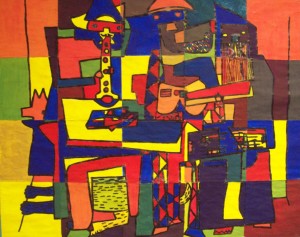As I type away, I look at the once empty wall of my room and see various memorabilia littered across. A signed sepia-toned Beats Antique poster from their Thousand Faces Act I tour, stylishly portraying a fantasy land with landmarks named after each track in the album. An Atlanta Falcons flag with a throwback logo, from my first NFL football game. A print of a Banksy classic, bought from the depths of the Amazon. Okay, so that one I bought online, but you get the drift.
Still, centered in this cluster of human expression is a single framed drawing. The picture, crude and rough around the edges, has little else but three stick figures standing in a yard, colored in as close to the lines as possible without crayon spilling beyond the boundaries. It’s my niece’s first gift to me, and beyond anything I own that I hold with any measure of sentiment, it is my most cherished piece of art.

Recently, fellow B-Sides writer Logan O’Brien wrote a great opinion piece suggesting a new business model for the music industry to continue its profitable ways. While that’s something to digest for those promoting album sales because of the sharing ways of us internet folk, fans of music instead should be asking themselves whether the music industry should be profiting at all.
Now don’t get me wrong. I think artists by and large deserve every penny they earn. Making music is not a cheap process, whether we’re talking about financial investment or simply the time and dedication. So it’s not to say that I see it as a fault if an artist decides that the sacrifice he has made in order to create, also needs to be able to pay his bills.

That being said, there is something beautiful in making sacrifice without expectation. To make music simply for the sake of sharing a piece of your soul with your community is, in no equivocal terms, magical. Pretty Lights Music is one of many labels who embrace this notion of sharing for the sake of sharing, fans only contributing if they feel that they personally owe it to the artist.
And that’s something for fans to decide because, when art is made strictly for the sake of expression, there can be no assignable value to it. A Picasso is a stunning and rare piece of art, but you couldn’t pay me the money necessary to buy a Picasso for the picture my niece drew for me. And that’s because the picture represents the piece of her soul that she gave to me, and to sell it would mean selling a piece of my own as her gift is a part of who I am now.

To place a price on art cheapens its value to what’s been profited off of it. Which is nothing to judge. After all, I walk into work 40 hours a week at my other job, not because it’s artistic and feeds my soul, but because I too have to make money to pay the bills. But in the age of information, of digital freedom, where sharing your soul to the world at large is such a possibility, it might be time to reevaluate the standards we hold our artists to. Maybe it isn’t our place to draw such distinctions. But, at the least, I would ask any aspiring musician to ask themselves these questions: Is it the notes on the page, or the sacrifice made to craft music what makes it artistic? What is the reason I make music?

